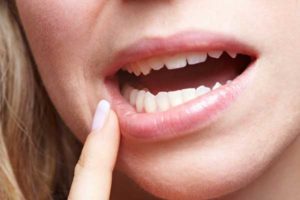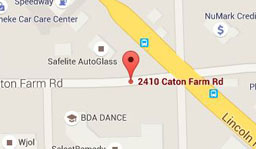3 Common Oral Lesions

You might ignore your mouth health until something starts to hurt. One common cause of oral pain is mouth sores, but not all oral lesions are the same. While some clear up on their own in a few days, others may require surgery. If you would like to learn more, check out these three common types of oral lesions.
1. Canker Sores
Canker sores are small ulcers in the mouth, and they can result from a variety of causes. Some of the most common sources of mouth sores are minor injuries from biting your cheek, poking yourself with a fork, snagging your cheek with a damaged tooth, or getting food stuck along the gums. Other causes include certain food sensitivities, certain vitamin and mineral deficiencies, and hormonal stress.
Most canker sores are small, and they may have a red edge. These sores can sting, but they tend to heal without any side effects. In rare cases, you may develop a major canker sore. These are large and have irregular edges. They can cause more severe pain and take six weeks to heal.
Your dentist may be able to give you topical creams that can reduce pain and speed healing. Your dentist may also recommend a mouth rinse. If you suffer from recurrent canker sores, talk with your dentist about the underlying cause. In some cases, simply changing your toothpaste to a mild one can help. In addition, your dentist can look for any underlying causes, such as gum disease.
2. Denture Sores
Dentures are an affordable and easy way to replace missing teeth. However, unlike dental implants, you can’t brush and clean them like regular teeth. If you have dentures, you should clean them overnight and give your gums a breather.
You should also make sure the dentures fit properly. In many cases, your dentures eventually become too big. At first, they fit, but as your jaw shrinks, the dentures stay the same size. Poorly fitted dentures are more likely to move around. As a result, they rub and irritate the gums, which increases the risk of breaking the skin.
Food can also easily get trapped under oversized dentures. Even small bits of food under the dentures can irritate the gums, which can lead to sores. The best way to fight denture sores is to stop them from happening. Talk with your dentist to ensure your dentures fit. Your dentist can also give you advice on what foods to avoid to prevent sores under the dentures.
3. Oral Cancer
Anytime you have a sore in your mouth, you may want to have it checked out by your dentist because many oral lesions can be signs of oral cancer. Oral cancer can affect any part of the mouth.
Oral cancer lesions tend to be white or reddish, but some appear as a lump. Naturally, sores that appear for no apparent reason and sores that don’t seem to go away are worrisome. If your oral lesions present with loose teeth, mouth pain, ear pain, and difficulty swallowing, make an appointment with your dentist.
Treatment for oral cancer works best when it’s started as soon as possible. Luckily, regular visits to your dentist can help spot signs of cancer before it progresses. If your dentist diagnosis you with oral cancer, you may need to undergo surgery to remove the affected tissue or have radiation therapy to kill the cancerous cells.
Oral lesions can be minor canker sores that disappear after a few days, but in severe cases, they may need professional medical care. If you would like to learn more, or if you would like to talk about oral cancer screening, contact us at Crest Hill Family Dental today.

